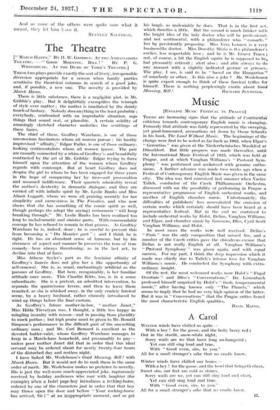Mus i c
[ENGLISH MUSIC: FESTIVAL. IN PRAGUE]
THERE are increasing signs that the attitude of Continental' criticism towards contemporary English music is changing. Formerly that attitude was fairly represented by the sweeping, yet good-humoured, accusations set down by Oscar Schmitz in his book, The Land Without Music. The beginnings of the change were first to be noted as far back as 1902, when Elgar's " Gerontius " was given at the Niederrheinisches Musikfest at Dfisseldort But little progress was made thereafter, until the International Music Festival of 1925, which was held at Prague, and at which Vaughan Williams's "Pastoral Sym- phony" was performed and acclaimed with genuine enthu- siasm. A further advance was made two weeks ago when a Festival of Contemporary English Music was given in the same city. The idea was first conceived last summer when Vaelav Talich, conductor of the Czech Philharmonic Orchestra, discussed with me the possibility of performing in Prague a representative programme of English orchestral works, and another of English chamber music. Unfortunately, the difficulties of publishers' fees necessitated the omission of certain works which certainly should have been heard at a representative festival. But in the end we contrived to include orchestral works by Hoist, Delius, Vaughan Williams, and Elgar, and chamber music by Goossens, Bliss, Cyril Scott Vaughan Williams, and Hoist.
In most cases the works were well received. Delius's "Paris " was the only composition that missed fire, and a number of the Czech critics gave the chivalrous excuse that Delius is not really English at all. Vaughan Williams's "Pastoral Symphony" was given again, and with equal success. For my part, I think the deep impression which it made was chiefly due to Talich's intense love for Vaughan Williams's music. He conducted the Symphony with extra- ordinary insight.
Of the rest, the most welcomed works were Hoist's "Fugal Overture '3 and Bliss's "Conversations." Dr. Ltiwenbach professed himself surprised by Hoist's "fresh, temperamental music," after having known only "Tile Planets," which seems to imply that he had no very high opinion of the latter. But it was in " Conversations " that the Prague critics found the most characteristic English qualities.
BASII. MAINE.






























 Previous page
Previous page